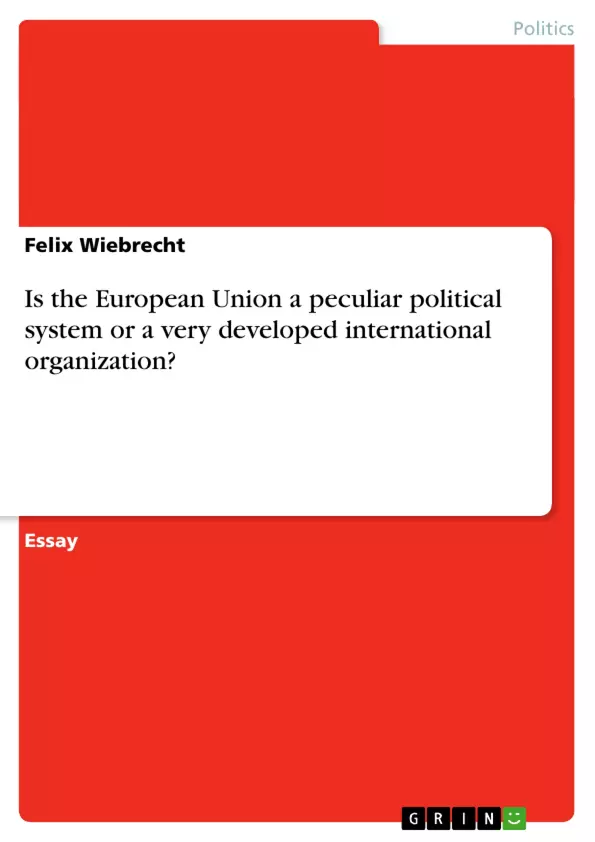The EU nowadays is a very powerful political actor and has a very big influence, not only in
Europe, but also in the rest of the world. Starting from a community for joint coal and steel
administration it developed further and further. Today there is a discussion among scholars about
the type of political actor the EU constitutes. Is it an international organization, a political system, a
supranational state or something completely new and incomparable. This paper wants to prove that
the European Union is not an international organization, despite having some of the appropriate
characteristics, but rather a political system. In order to achieve that it will try to define the terms
'political system' and 'international organization' and then evaluate if the characteristics of those
match with the European Union as a political actor.
Inhaltsverzeichnis (Table of Contents)
- Is the European Union a Peculiar Political System or a Very Developed Political System?
- International Organizations
- Political Systems
- Supranational State
Zielsetzung und Themenschwerpunkte (Objectives and Key Themes)
This paper seeks to understand the nature of the European Union and argue that it is a political system rather than an international organization. The paper will analyze the EU's characteristics and compare them to the features of both international organizations and political systems.
- The definition of "political system" and "international organization."
- The comparison of these definitions to the European Union's structure and function.
- The distinction between the European Union and other international organizations.
- The debate surrounding the EU as a supranational state.
- The potential of the EU to be a state.
Zusammenfassung der Kapitel (Chapter Summaries)
The paper begins by defining the term "international organization" and analyzing its characteristics, drawing upon the work of Rittberger and Zangl (2006). The paper finds that the European Union meets the criteria of an international organization in terms of its pooled sovereignty, shared decision-making, and involvement in diverse policy areas. However, the paper argues that the EU’s influence and autonomy surpass those of typical international organizations.
The paper then turns to the definition of "political system" using insights from Almond (1956) and Easton (1957). The paper demonstrates that the EU possesses the characteristics of a political system, including a set of institutions for collective decision-making, rules governing inter-institutional relations, the ability to influence economic resource distribution, and the presence of feedback mechanisms.
The paper concludes by exploring the potential of the European Union to be considered a supranational state. While the EU shares similarities with national political systems, such as binding decisions, legislative, executive, and judicial institutions, and supreme law, it lacks certain key characteristics of a state, namely a monopoly over legitimized violence, fiscal authority, and independent law enforcement institutions.
Schlüsselwörter (Keywords)
The paper explores the nature of the European Union, examining its characteristics in relation to international organizations and political systems. Key topics include: international organizations, political systems, supranational states, pooled sovereignty, decision-making processes, institutional structures, and the EU's role in global politics.
Frequently Asked Questions
Is the European Union an international organization or a political system?
The paper argues that while the EU has characteristics of an international organization, it is more accurately described as a political system due to its autonomous decision-making and institutional complexity.
What defines a "political system" in the context of the EU?
A political system features institutions for collective decision-making, rules governing relations, and the ability to influence the distribution of economic resources.
Can the EU be considered a supranational state?
The EU shares similarities with states, such as binding laws and judicial institutions, but lacks a monopoly on legitimized violence and independent fiscal authority.
What is "pooled sovereignty"?
It refers to member states sharing their authority with central EU institutions to make joint decisions that are binding for all members.
How does the EU influence global politics?
As a powerful political actor, the EU exerts influence through its unified economic policies, legislative standards, and diplomatic cooperation.
- Arbeit zitieren
- Felix Wiebrecht (Autor:in), 2013, Is the European Union a peculiar political system or a very developed international organization?, München, GRIN Verlag, https://www.grin.com/document/215582



